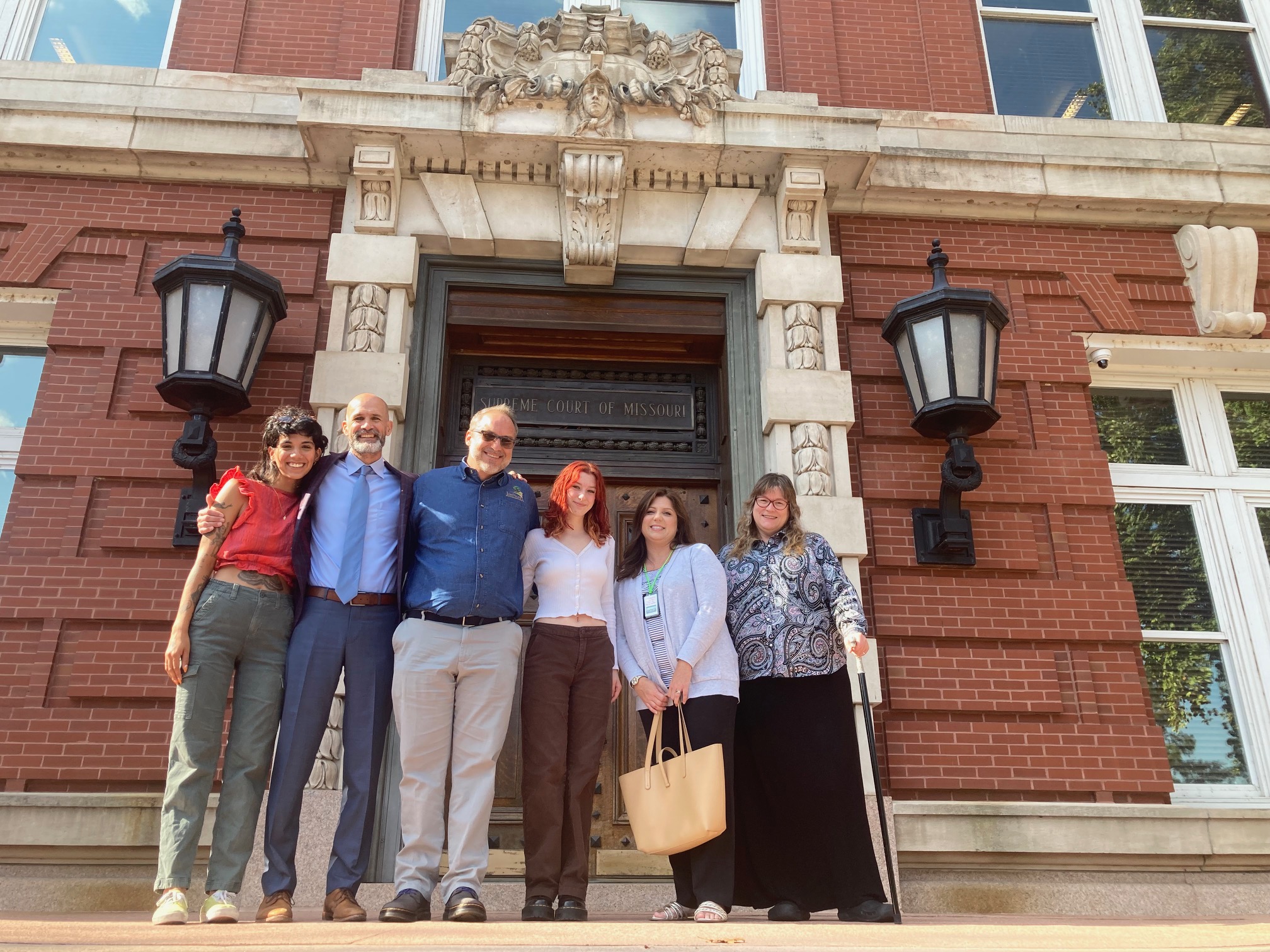The Missouri Supreme Court heard arguments in an appeal in a case involving Springfield-based nonprofits the Gathering Tree and Eden Village.
The plaintiffs in Johnathan Byrd, et al., The Gathering Tree d/b/a Eden Village v. State of Missouri are challenging a relatively new law that many Missourians view as criminalizing homelessness.
The law was created by House Bill 1606, an omnibus bill that officially pertained to political subdivisions. It was signed into law by Gov. Mike Parson in 2022. Since then, it has garnered attention and controversy throughout the state for a provision that makes it a misdemeanor crime to sleep, live, or build shelter on state government-owned property without permission.
Attorneys for the appellants, Adina Rosenbaum and Benjamin Stringer argued to the Supreme Court judges HB1606 violates the single subject, clear title, and original purpose requirements of the Missouri Constitution.
“The critique of this bill is not that it doesn't address political subdivisions. The critique is that it addresses political subdivisions and other matters that are outside political subdivisions,” Stringer said in court. “The state has tried to argue that this criminalization of homelessness relates to political subdivisions because political subdivisions become the enforcer of this provision.
“But if that were true, you could rewrite the entire criminal criminal code and say political subdivisions are the enforcer of the criminal code, label the bill related to political subdivisions and all of the sudden, you’ve rewritten the entire criminal code under the auspice of relating to political subdivisions,” Stringer continued. “For these reasons, we ask HB1606 be found unconstitutional.”
How did it get to the state Supreme Court?
The Gathering Tree, a Springfield nonprofit best known for creating tiny home communities for unsheltered people, filed a lawsuit challenging HB 1606 in August of 2022. The suit alleged the law violated Article 3 of the Missouri Constitution “in that it violates the single subject and clear title requirements on its face,” and “the final version of the bill changed its original purpose.”
A second lawsuit challenging HB 1606 for essentially the same reasons was filed in September of 2022. Of the three plaintiffs, two are Greene County residents. The other plaintiff lives in Cape Girardeau.
In that second suit, plaintiff Johnathan Byrd lives and works in Greene County and is described in the suit as “a low-income worker who has experienced homelessness and housing instability and as a housing justice advocate.”

Plaintiff Jessica Honeycutt also lives and works in Greene County and is described as a “community health worker who provides services to people who are homeless and as a housing justice advocate.”
The two lawsuits were eventually joined and brought before Cole County Judge Cotton Walker in November 2022.
After a few months of consideration, Walker sided with the state’s case. The Gathering Tree and other plaintiffs asked the Missouri Supreme Court to hear its appeal, and the state’s highest court announced in mid-September it would do so.
The Missouri Supreme Court will decide on the appeal and issue its opinion in the coming weeks.
Appeal presents several questions
The first question before the Supreme Court is whether HB1606 violates the single subject requirement of the Missouri Constitution. Specifically, the section of the new law being challenged is 67.2300. The issues are whether this section fairly relates to political subdivisions; what effect, if any, the fact that section applies to entities beyond political subdivisions has on the single subject requirement; and whether that section imposes any oversight requirements on political subdivisions.
A second question involves whether HB1606 violates the state constitution’s clear title requirement.
A third question involves whether HB1606 violates the state constitution’s original purpose requirement. When the bill was originally introduced, it was titled an act relating to “county financial statements.” The bill sought to reduce the amount of financial information certain counties were required to publish in newspapers.
Clayton Weems with the Missouri Attorney General’s Office argued to the justices that the appellants are asking the judges to look at one subsection of the law “in complete isolation” and that the following subsection of the law clarifies how the subsections is related to political subdivisions.

In the brief submitted by the Attorney General’s Office, the state argues the section does relate to political subdivisions, particularly with regards to funding for homeless services.
“Section 67.2300 provides political subdivisions with state funding to properly serve their homeless constituents, and places guardrails to ensure those state funds are spent appropriately,” part of the brief reads. “As such, the circuit court correctly found that Section 67.2300 ‘plainly relates to HB 1606’s single subject regarding the operation and regulation of political subdivisions.’”
Was the language ‘slipped in’ to the bill?
The appellant brief details how HB 1606 made its way through the House of Representatives, then Senate and eventually winding up of Parson’s desk. What started out as legislation related to county financial statements and how they should be published in newspapers went through multiple revisions with language, amendments and provisions added and removed —including the language related to unauthorized camping.
Missouri House Minority Leader Crystal Quade, D-Springfield, shared with the Daily Citizen earlier this year that several lawmakers didn’t realize the language about homelessness had been added to the bill when they voted for it last year.

“This was added on to a giant omnibus bill right at the end of the session, and a lot of folks didn’t know,” Quade said in January, “because the underlying bill we were all supportive of. And then there were several amendments added at the very last, I think it may have been the last week of session.”
Stringer, in a phone interview Tuesday, explained the importance of the single subject and original purpose requirements in the state constitution.
“The single subject requirement,” Stringer said, “the reason that is important is so that something like this doesn’t happen, so you don’t have something that says, ‘This is what the bill is about,’ but it’s actually about a bunch of different topics.
“The same thing with original purpose,” he said, “so that you don’t introduce a bill that is about reducing the publication costs associated with county financial statements and then at the end of it, you are criminalizing homelessness.
“The whole idea is that you are passing bills through the legislature in a way that is systematized so that people who have an interest in these bills can know what is happening and can respond to them. Not just legislatures. But people. Actual people,” Stringer said. “(These laws) impact the lives of people and that is why you have a limitation on a single subject. Because if you don’t, then you can have a bill that affects people’s lives in a variety of ways and it’s too hard to track these things. It’s too hard to know what’s in bills that are hundreds of pages long.”
It is not known when the Missouri Supreme Court will issue its opinion on the case.


